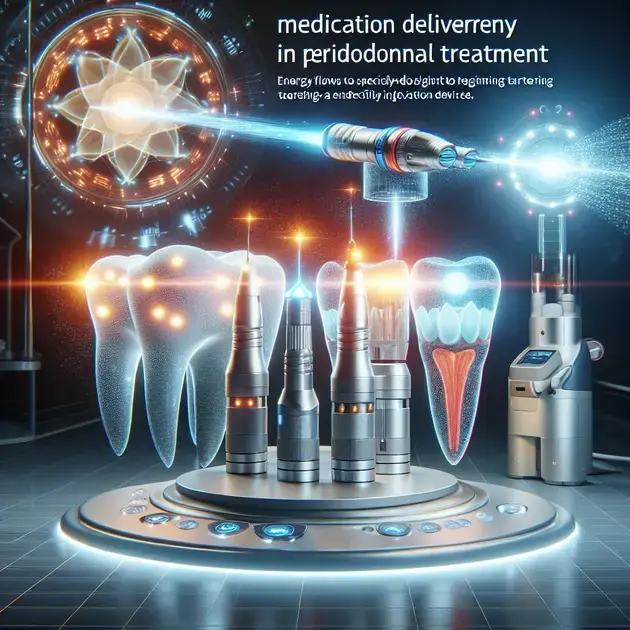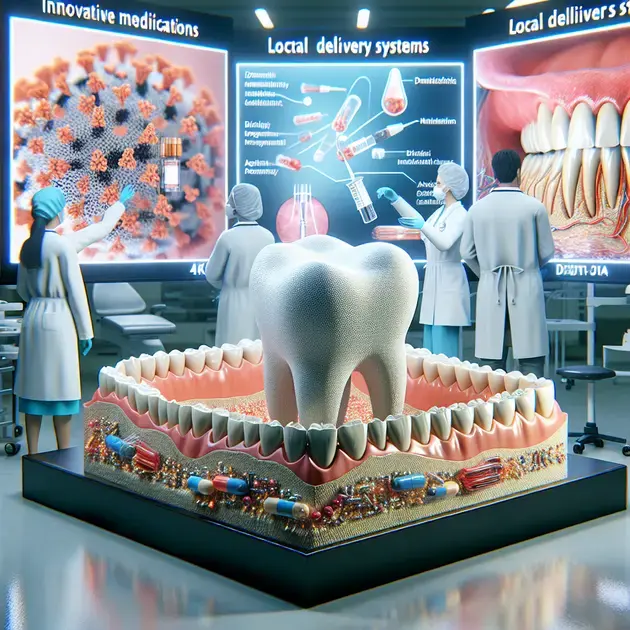Periodontitis, a severe gum infection that can damage the soft tissue and destroy the bone supporting your teeth, requires effective medication for treatment. The key to successful management of periodontitis lies in finding the right medication that can help control the bacterial infection and reduce inflammation.
Recent advancements in dental research have led to the development of new medications that show promising results in the treatment of periodontitis. These innovative medications not only target the underlying causes of the infection but also promote tissue regeneration, helping to restore oral health effectively.

Innovative Medications for Periodontitis Management
Periodontitis is a common dental issue that affects many individuals worldwide. Fortunately, there are innovative medications available now for effectively managing this condition. One promising medication is Arestin, a locally administered antibiotic that targets and eliminates the harmful bacteria causing periodontitis.
To access Arestin treatment, you can consult with your dentist during a regular check-up or dental cleaning appointment. The dentist will assess your periodontal health and determine if Arestin is a suitable option for you. The application process involves the dentist placing the Arestin microspheres directly into the periodontal pockets, where the bacteria reside.
Another innovative medication for periodontitis management is Periostat, a systemic antibiotic that works by inhibiting the enzymes that break down gum tissue. To obtain a prescription for Periostat, you can schedule a consultation with a periodontist or a dentist experienced in treating gum disease. The medication is usually taken twice daily with food for optimal absorption and effectiveness.
In addition to prescription medications, incorporating a diligent oral hygiene routine is essential for managing periodontitis. This includes brushing twice a day with a fluoride toothpaste, flossing daily, and using an antimicrobial mouthwash recommended by your dentist.
By combining innovative medications like Arestin and Periostat with professional dental care and proper oral hygiene practices, individuals can effectively manage periodontitis and improve their overall oral health.
Promising Results of New Periodontitis Medications
The introduction of new medications for the treatment of periodontitis has shown promising results in restoring oral health and preventing the progression of gum disease. Clinical studies have demonstrated the efficacy of these medications in reducing gum inflammation, controlling bacterial growth, and promoting gum tissue regeneration.
Arestin
Studies have shown that Arestin treatment leads to a significant reduction in periodontal pocket depth and a decrease in gum bleeding. This localized antibiotic therapy effectively targets the bacteria causing periodontitis, leading to improved clinical outcomes and long-term gum health.
Periostat
Research has indicated that Periostat therapy can help prevent the breakdown of gum tissue and support the reattachment of the gums to the teeth. By inhibiting the destructive enzymes that contribute to gum disease, Periostat promotes a healthier oral environment and reduces the risk of disease progression.
To achieve the best results with these new periodontitis medications, it is crucial to follow the prescribed treatment plan provided by your dental healthcare provider. This may include regular monitoring of your gum health, maintenance visits for professional cleanings, and adherence to medication guidelines.
Overall, the promising results of new medications for periodontitis offer hope for individuals struggling with gum disease, providing effective treatment options to restore oral health and preserve the integrity of the gums and supporting structures.

Effective Medication Options for Periodontitis Treatment Explained
When it comes to treating periodontitis, there are several effective medication options that can help alleviate symptoms and promote oral health. One common medication is chlorhexidine mouthwash, which is an antiseptic that can help reduce bacteria in the mouth and prevent infection. Another medication option is antibiotic therapy, which may be prescribed to help control bacterial growth and inflammation in the gums.
For more severe cases of periodontitis, a dentist may recommend the use of systemic antibiotics, such as doxycycline or metronidazole, to help combat the infection. These medications work by targeting the bacteria causing the gum disease and reducing inflammation. It’s important to follow your dentist’s instructions carefully when using any medication for periodontitis treatment to ensure optimal results.
In addition to traditional medications, some patients may benefit from non-surgical treatments like scaling and root planing, which can help remove plaque and tartar from below the gumline. These treatments, combined with medication options, can help improve gum health and prevent further progression of periodontitis.
Overall, effective medication options for periodontitis treatment play a crucial role in managing the disease and promoting oral health. By working closely with your dentist and following their recommendations, you can successfully combat periodontitis and maintain a healthy smile.
Innovative Approaches to Antibiotics in Periodontal Care
Antibiotics are a common treatment option for periodontal care, but innovative approaches are constantly being developed to improve their effectiveness. One such approach is the use of local antibiotic delivery systems, such as antibiotic-infused gels or microspheres, which can be placed directly into periodontal pockets to target bacteria more effectively.
Another innovative approach is the development of antibiotic-coated materials, such as surgical sutures or dental implants, which can help prevent bacterial growth and infection during dental procedures. These materials slowly release antibiotics over time, providing long-lasting protection against periodontal pathogens.
In some cases, dentists may also recommend combination therapy, which involves using different types of antibiotics together to target a broader range of bacteria. This approach can help prevent antibiotic resistance and improve treatment outcomes for patients with severe or resistant forms of periodontal disease.
Overall, innovative approaches to antibiotics in periodontal care are helping to enhance treatment outcomes and provide more targeted solutions for patients with gum disease. By staying informed about the latest advancements in antibiotic therapy, dentists can offer more personalized and effective care for their patients.
Enhancing Medication Delivery in Periodontal Treatment
Enhancing medication delivery in periodontal treatment is essential for ensuring that medications reach their intended target and provide maximum benefit. One approach to enhance medication delivery is the use of localized drug delivery systems, such as medicated mouthwashes or gels, which can be applied directly to the gums to target bacteria and reduce inflammation.
Another method to enhance medication delivery is through the use of innovative devices, such as air-polishing systems or ultrasonic scalers, which can help remove plaque and tartar from the teeth and gums, allowing medications to penetrate more deeply and effectively treat the infection.
Some dentists may also recommend the use of customized treatment plans that combine different medications and delivery methods to address individual patient needs. This personalized approach can help optimize treatment outcomes and improve patient compliance with medication regimens.
By enhancing medication delivery in periodontal treatment, dentists can improve the efficacy of medications and provide better outcomes for patients with gum disease. It’s important for patients to follow their dentist’s recommendations closely and adhere to their medication schedule to achieve the best results in managing periodontitis.
Conclusion
In conclusion, the effective medication options for periodontitis treatment highlighted various essential approaches to managing gum disease. From chlorhexidine mouthwash to systemic antibiotics like doxycycline, these medications play a crucial role in alleviating symptoms, controlling bacterial growth, and promoting oral health. It is imperative for patients to follow their dentist’s recommendations meticulously to ensure optimal results and combat periodontitis successfully.
Moreover, innovative approaches to antibiotics in periodontal care, such as local antibiotic delivery systems and antibiotic-coated materials, are continuously evolving to enhance treatment outcomes. By staying informed about the latest advancements in antibiotic therapy and utilizing combination therapy where necessary, dentists can provide more personalized and effective care for patients with gum disease.
Enhancing medication delivery in periodontal treatment through localized drug delivery systems and innovative devices like air-polishing systems is essential for ensuring medications reach their intended target and provide maximum benefit. Customized treatment plans that combine different medications and delivery methods can optimize treatment outcomes, improve patient compliance, and ultimately provide better results in managing periodontitis.



